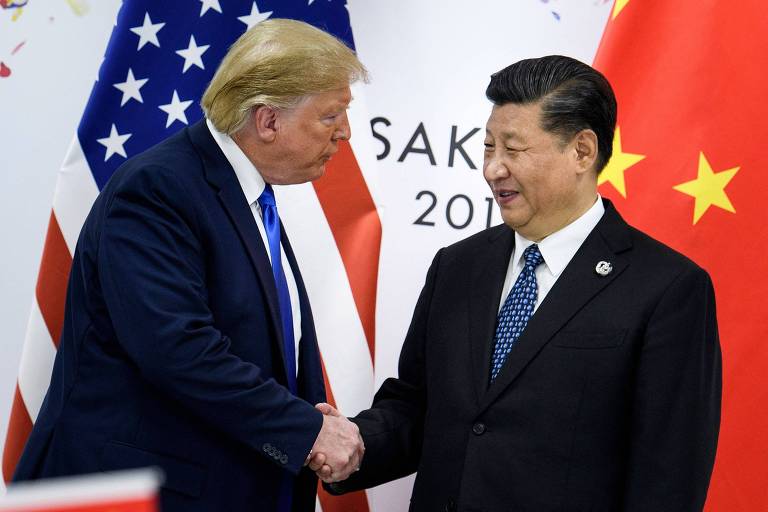Chinese debt equals that of the US and creates problems for Brazil

The United States and China, the world's two largest economies, are on explosive trajectories for increasing their public debt.
The Americans have surpassed 100% in relation to GDP (Gross Domestic Product) and the Chinese will reach this mark at the end of this year. In both, there has been a strong recent acceleration, with an upward trend.
For the rest of the world and heavily indebted countries like Brazil , there will be pressure on central banks to keep interest rates high in order to attract lenders to their debts – as the two giants suck money from the world to roll over debts.

In April, Fitch Ratings downgraded its rating for Chinese foreign-currency debt from "A+" to "A" (on a scale of "AAA"), which should increase the cost of rolling over the debt.
China has been rapidly going into debt. In the first four months of the year, total debt owed by emerging markets (governments, companies and households) increased by US$3.5 trillion. China accounted for US$2 trillion, according to the IIF (Institute of International Finance). In 2019, Chinese public debt was equivalent to 60% of GDP – now it is at 93%.
China's debts have been boosted by its decision a few years ago to stimulate domestic demand. This has been reinforced by the trade war launched by the United States , which could limit China's access to the United States, which accounts for 15% of its exports. Another factor has been the growing deficits of regional governments.
About 80% of local government revenues come from renting land for real estate developments, which have been squeezed by an oversupply of housing. To get around this, authorities have allowed regional governments to issue bonds on the market, increasing their debt.
China also has a growing fiscal deficit (revenue minus expenditure). It is expected to reach 8.5% of GDP this year – up from an average of 6.5% between 2020 and 2024 and more than double the 3% between 2015 and 2019. This means that the country, in addition to being in debt, will have larger deficits that will increase the debt.
In the US, the situation is no better. Donald Trump's recently reaffirmed promise to extend tax cuts adopted in 2017 (in his first administration) could increase public debt by 15 percentage points over the next nine years, according to projections from the Congressional Budget Office – which calculates even worse scenarios if the president is unable to compensate for the loss of revenue with more tariffs and other measures.
Calculations by the IIF and the Tax Foundation argue that the Trump administration's estimates for raising more revenue from tariffs and spending less on Doge (with Elon Musk at the helm) are unrealistic to offset the revenue lost from tax cuts.
To finance the loss of revenue, the US would have to issue ever more bonds, pushing up interest rates around the world – because many economies have to pay a premium over so-called US T-bonds to attract investors to roll over their debts. Otherwise, US bonds would be preferred.
U.S. growth is also under threat. Since GDP is the denominator for calculating the debt-to-GDP ratio, debt increases if the country does not grow, raising the level of debt relative to the size of the economy.
"We'll be lucky if the US comes out of the year better off than in a recession. Everyone will be hurt by the tariff war, but the US is the biggest loser," said Isabelle Mateos y Lago, chief economist at French bank BNP Paribas.
She points out that so-called "American exceptionalism" – the privilege of financing itself at low cost in the world and of having the main reserve currency, the dollar – is also threatened by Trump's policies on tariffs and international diplomacy.
"This will create a more uncomfortable dynamic for the US as its bonds are increasingly questioned as to whether they are still a safe haven," he says.
Ed Parker, director of Fitch Ratings, says the world is entering a "new era of global debt," with pressures on spending on defense, pensions and health care. Meanwhile, U.S. growth will be lower, he says, and inflation will be higher -- with the impact of tariffed imports.
"This should lead to an increase in the interest rates that the US pays to finance itself," he says. As a result, countries like Brazil ( which has the third highest real interest rate in the world ) will have to maintain high rates to attract investors who could invest in the US, with lower risk.
Cathy Hepworth, managing director of PGIM Fixed Income, which manages $1.3 trillion in investments around the world, says the ongoing shift in the global economy, with the US and China leading the way, will bring significant changes.
"One should not underestimate the growing importance of China in the global economy and the consequences of the end of American exceptionalism," he says.
uol


